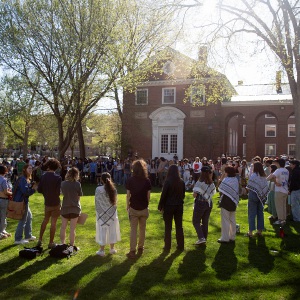Valley News Forum for March 26, 2023: Reject the ideological divide
| Published: 03-26-2023 6:04 AM |
I’m a Liberal. Those are my values. I heartily accept that those on the Right may find my values in conflict with theirs. But we lefties and you righties have lost our way. Both sides see the other as existential threats. Both sides vilify and dehumanize the other.
And yet, isn’t it fascinating that both sides use the words “freedom” and “liberty” in pretty much identical ways? The left sees the actions of the right (educational book-banning, anti-abortion and anti-DEI legislation, voter suppression, etc.) as a threat to freedom and democracy. And the right sees the actions of the left (woke anti-free speech efforts, gun control legislation, CRT pedagogy, Silicon Valley bank bailouts, etc.) as a threat to freedom and democracy.
Both sides feel that their fight is a righteous fight, a fight for the very soul of the Republic. And both sides are entirely convinced that if the other side wins, the grand experiment ends; that freedom is lost.
This is the narrative that drives the ever-widening ideological gap in Congress, in state legislatures, on the pages of this newspaper. And this is the narrative that demagogues exploit in order to entrench and radicalize their supporters. I am guilty of harboring these beliefs as well. It is time for us to reject this narrative, to ignore and dismiss the demagogues, and to break bread with our neighbors — all of them.
Dan Weintraub
Quechee / Boston
On Sept. 1, 2022, President Joe Biden proclaimed that the Declaration of Independence and the Constitution “and the ideas they embody — equality and democracy — are the rock upon which this nation is built.” He called for “our nation to come together, unite behind the single purpose of defending our democracy regardless of your ideology.”
Biden’s appeal has not yet instilled a united front. Rather, we are being torn apart by divided camps that bespeak hatred and fear toward others. We face terrorism that is dangerously amorphous and amplified by social media. It begs the question: What will it take to hold our country together?
Article continues after...
Yesterday's Most Read Articles
 Dartmouth administration faces fierce criticism over protest arrests
Dartmouth administration faces fierce criticism over protest arrests
 West Lebanon crash
West Lebanon crash
 Plan on track to ship Upper Valley mail to Connecticut for sorting
Plan on track to ship Upper Valley mail to Connecticut for sorting
 Lebanon’s Jewell back from auto accident, more aware of ‘drowsy driving’ dangers
Lebanon’s Jewell back from auto accident, more aware of ‘drowsy driving’ dangers
 Longtime employees buy West Lebanon pizzeria
Longtime employees buy West Lebanon pizzeria
Historical accounts of two former leaders of our country who faced serious crises might provide answers.
Washington, as commander of the Continental army, faced truly alarming situations: an ill-equipped army, disaffection among the colonies, defeat in the early stages of the war and the sufferings at Valley Forge in 1778. He worried that “the game is pretty much up.” During the winter of 1862-1863, Lincoln faced wide dissatisfaction with his war leadership. By New Year’s Day, 1863, news from the battlefield was bad, slavery endured, racial prejudice ruled, the Confederacy stood. On May 6, 1863, Lincoln was despondent exclaiming, “My God, Stanton, our cause is lost.”
In response to these dire circumstances both leaders modeled for colonists / citizens grit, a vision of freedom, and moral courage. Our country presented a united front to quell a crisis. What can we learn from these two historical examples?
Like Washington and Lincoln, President Biden is exemplary in his commitment to equality and freedom. His efforts, however, have not spawned a united front. This might be due to the fact that we have no singular focus as war was for Washington and Lincoln. We face innumerable issues like political strife, domestic terrorism, climate change. Each issue creates an alarm, but is dealt with in mutually exclusive ways. We face a number of “wars” with associated enemies but no one enemy that would create a united front. We need a clarion call to collaborate and — connect the dots.
Bob Scobie
West Lebanon
I find myself once again amazed to substantially agree with Steve Nelson (“Law school wrong to hide the uncomfortable,” Feb. 26), who wrote to challenge painting over a “racist” wall mural at Vermont Law and Graduate School (VLGS). While he and I seldom agree on much, I do feel he makes a valid point about eradicating things that make us uncomfortable.
Franklin D. Roosevelt’s famous speech, drawn from the work of others, enumerated the “Four Freedoms” as freedom of speech, freedom of worship, freedom from want, freedom from fear, to which we have apparently added a fifth: “freedom from being uncomfortable.” It seems that on college campuses and in public life, people are on hair-trigger against the possibility of being offended. Some would elevate it to the status of the eleventh component of the Bill of Rights.
Whether it’s statues of Confederate generals in southern states or the Dilbert cartoon strip (of which I was no great fan), there seems to be no end of stimuli to offend us or at least make us feel uneasy. The root cause seems to be the notion that everyone should think, speak, and act exactly as we do. When someone else’s artistic expression differs from how we would have done it, we get upset. If someone dares to express an opinion that is not according to our standard, we try to eradicate it — this is true of conservatives as well as liberal radicals, and often of Christians as well as atheists.
I know that my words may offend some people. No one in their right mind sets out to alienate or antagonize others, but sometimes it is an unintended and unavoidable, yet necessary, consequence of standing up for what we feel is right. Jesus said, “It is (inevitable) that offenses should come, but woe unto those by whom they come.” The big question is, “Do we offend to hurt, or to heal?” If our goal is to stimulate healthy interaction between people who disagree, we do it to heal.
When was the last time you engaged in trying to understand people with whom you disagree?
William A. Wittik
Hartford

 Editorial: Hartford is right to give banners due consideration
Editorial: Hartford is right to give banners due consideration Editorial: Response to campus protests only adds fuel to the fire
Editorial: Response to campus protests only adds fuel to the fire Editorial: Chris Sununu’s moral vacuum
Editorial: Chris Sununu’s moral vacuum Editorial: Gambling tarnishes America’s sporting life
Editorial: Gambling tarnishes America’s sporting life
